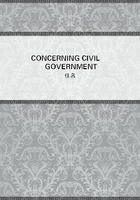
第2章
Of the State of Nature 4. To understand political power aright, and derive it from its original, we must consider what estate all men are naturally in, and that is, a state of perfect freedom to order their actions, and dispose of their possessions and persons as they think fit, within the bounds of the law of Nature, without asking leave or depending upon the will of any other man.
A state also of equality, wherein all the power and jurisdiction is reciprocal, no one having more than another, there being nothing more evident than that creatures of the same species and rank, promiscuously born to all the same advantages of Nature, and the use of the same faculties, should also be equal one amongst another, without subordination or subjection, unless the lord and master of them all should, by any manifest declaration of his will, set one above another, and confer on him, by an evident and clear appointment, an undoubted right to dominion and sovereignty.
5. This equality of men by Nature, the judicious Hooker looks upon as so evident in itself, and beyond all question, that he makes it the foundation of that obligation to mutual love amongst men on which he builds the duties they owe one another, and from whence he derives the great maxims of justice and charity. His words are:
"The like natural inducement hath brought men to know that it is no less their duty to love others than themselves, for seeing those things which are equal, must needs all have one measure; if I cannot but wish to receive good, even as much at every man's hands, as any man can wish unto his own soul, how should I look to have any part of my desire herein satisfied, unless myself be careful to satisfy the like desire, which is undoubtedly in other men weak, being of one and the same nature: to have anything offered them repugnant to this desire must needs, in all respects, grieve them as much as me; so that if I do harm, I must look to suffer, there being no reason that others should show greater measure of love to me than they have by me showed unto them; my desire, therefore, to be loved of my equals in Nature, as much as possible may be, imposeth upon me a natural duty of bearing to themward fully the like affection. From which relation of equality between ourselves and them that are as ourselves, what several rules and canons natural reason hath drawn for direction of life no man is ignorant." (Eccl. Pol. i.)*
* Richard Hooker, The Laws of Ecclesiastical Polity.
6. But though this be a state of liberty, yet it is not a state of licence; though man in that state have an uncontrollable liberty to dispose of his person or possessions, yet he has not liberty to destroy himself, or so much as any creature in his possession, but where some nobler use than its bare preservation calls for it. The state of Nature has a law of Nature to govern it, which obliges every one, and reason, which is that law, teaches all mankind who will but consult it, that being all equal and independent, no one ought to harm another in his life, health, liberty or possessions; for men being all the workmanship of one omnipotent and infinitely wise Maker; all the servants of one sovereign Master, sent into the world by His order and about His business; they are His property, whose workmanship they are made to last during His, not one another's pleasure. And, being furnished with like faculties, sharing all in one community of Nature, there cannot be supposed any such subordination among us that may authorise us to destroy one another, as if we were made for one another's uses, as the inferior ranks of creatures are for ours.
Every one as he is bound to preserve himself, and not to quit his station wilfully, so by the like reason, when his own preservation comes not in competition, ought he as much as he can to preserve the rest of mankind, and not unless it be to do justice on an offender, take away or impair the life, or what tends to the preservation of the life, the liberty, health, limb, or goods of another.
7. And that all men may be restrained from invading others' rights, and from doing hurt to one another, and the law of Nature be observed, which willeth the peace and preservation of all mankind, the execution of the law of Nature is in that state put into every man's hands, whereby every one has a right to punish the transgressors of that law to such a degree as may hinder its violation. For the law of Nature would, as all other laws that concern men in this world, be in vain if there were nobody that in the state of Nature had a power to execute that law, and thereby preserve the innocent and restrain offenders; and if any one in the state of Nature may punish another for any evil he has done, every one may do so. For in that state of perfect equality, where naturally there is no superiority or jurisdiction of one over another, what any may do in prosecution of that law, every one must needs have a right to do.